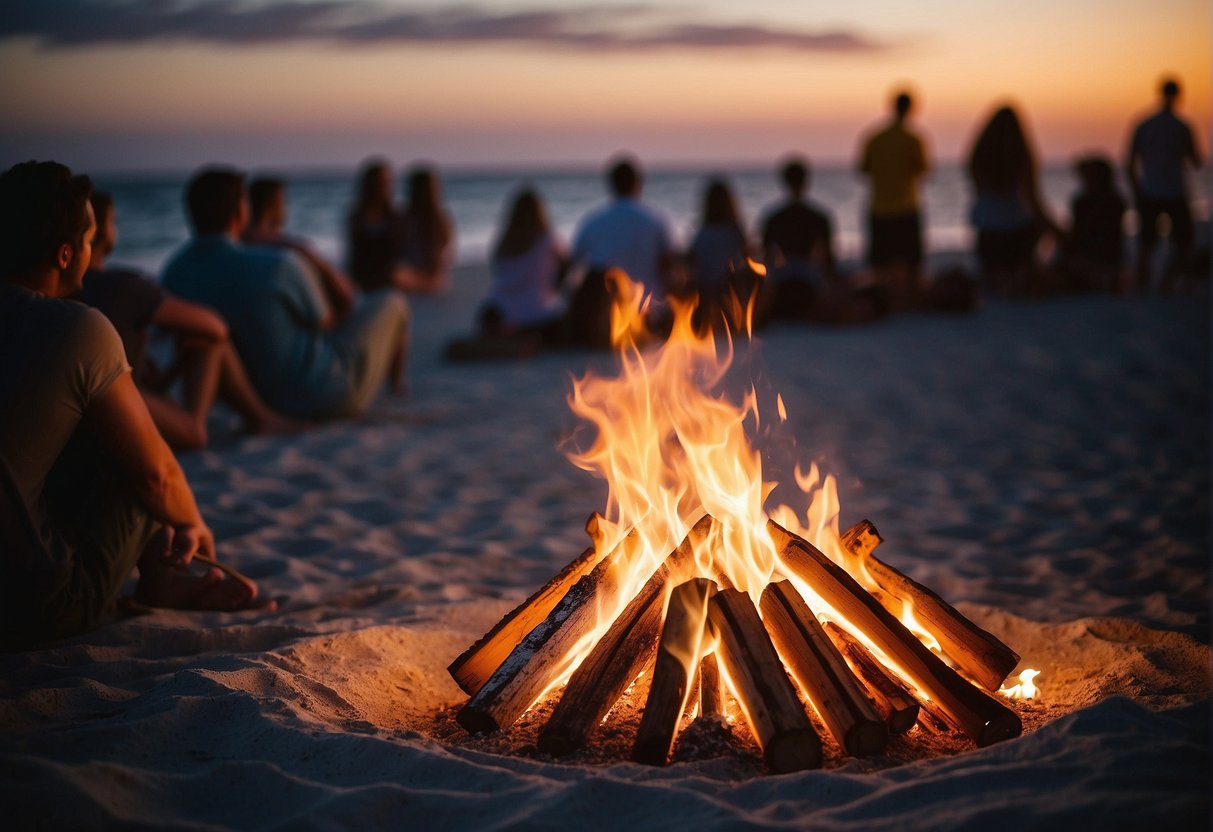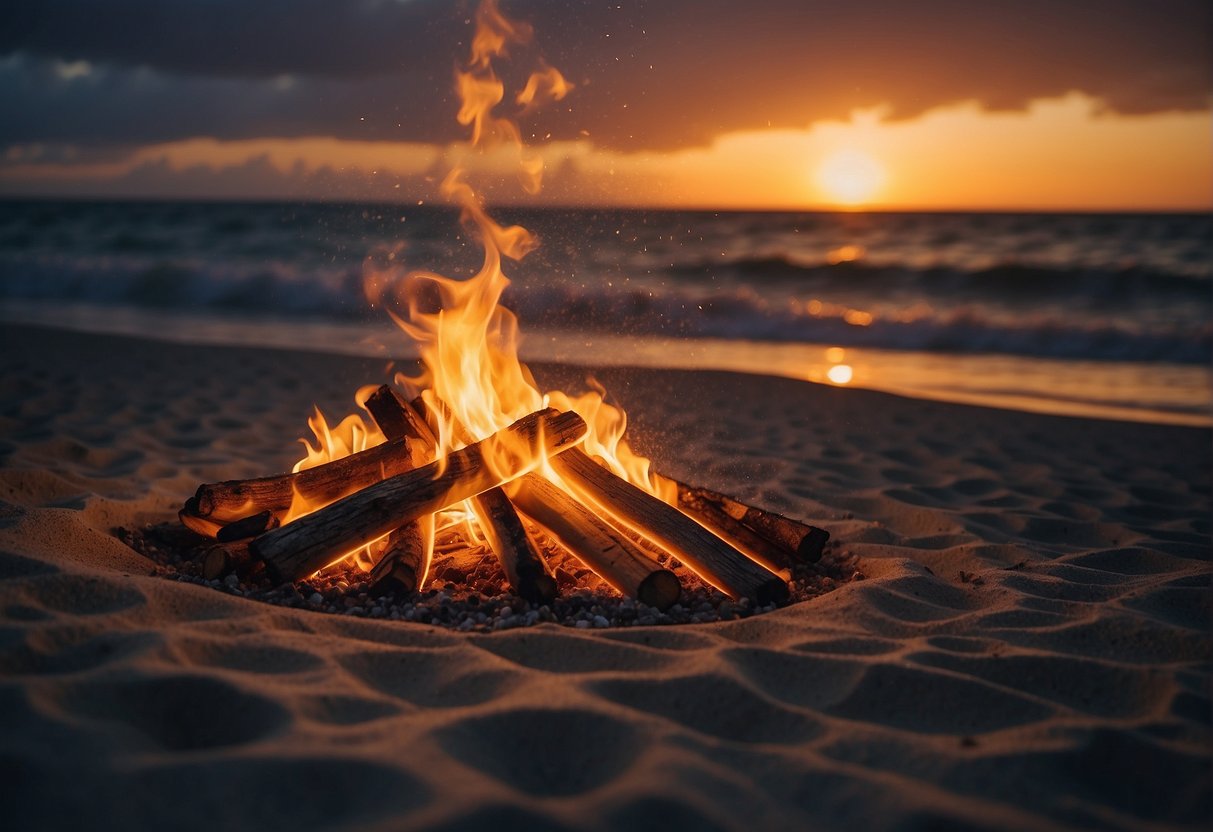Bonfire Regulations in Florida Beaches
If you’re planning to have a bonfire on a Florida beach, it’s important to be aware of the regulations and rules that apply.
In this section, we’ll cover the permit requirements and specific beach rules that you need to know before starting a bonfire.
Permit Requirements
In general, a permit is required for beach bonfires in Florida.
However, the permit requirements vary depending on the location.
For example, in Volusia County, no permit is necessary if you bring your bonfire pit, but all rules still apply.
Meanwhile, in Walton County, a permit is required for beach bonfires, and fines may be imposed for non-compliance.
To find out the specific permit requirements for the beach you plan to visit, check with the local recreation department or fire department.
Keep in mind that permits may have restrictions on the size of the fire, the type of fuel used, and the distance from habitable structures and vegetation.
Specific Beach Rules
In addition to permit requirements, there are specific rules that apply to beach bonfires in Florida.
For example, bonfires are not permitted on the beach during sea turtle nesting season, which typically runs from May to October.
Also, some beaches have restrictions on the type of wood that can be used for the fire.
For example, unprocessed wood is preferred, while wood containing nails, paint, or varnish is not allowed.
Some popular beaches that allow bonfires in Florida include Daytona Beach, Ormond Beach, and the Emerald Coast.
However, it’s important to check with the local authorities to ensure that you’re following all rules and regulations.
For example, the South Walton Fire District has specific rules on beach bonfires, including the requirement for a permit and a map of the fire location.
Planning Your Beach Bonfire

If you’re planning a beach bonfire in Florida, there are a few things to keep in mind to ensure a safe and enjoyable experience.
Here are some tips to help you plan your perfect beach bonfire.
Choosing the Right Location
Choosing the right location is crucial for a successful beach bonfire. Make sure you choose a location that is safe and legal for bonfires.
Many beaches in Florida allow bonfires, but some require a permit, and some prohibit them altogether.
Check with the local county or city authorities to find out the rules for the beach you plan to visit.
When choosing a location, consider the wind direction and the proximity to sea turtle nests, as well as other wildlife.
Also, make sure there is enough space for your group and that the location is easily accessible with parking nearby.
Safety and Environmental Considerations
Safety should always be a top priority when having a beach bonfire.
Make sure you have a fire pit or a fire ring to contain the fire and prevent it from spreading.
Never use tar, charcoal, or accelerants to start the fire, and only use kiln-dried firewood or other materials that are safe for burning.
To protect the environment, make sure you clean up all debris and trash after the bonfire, including any leftover firewood, chairs, and roasting sticks.
Avoid using plastics and other non-biodegradable materials, and never leave any garbage or waste on the beach.
Additionally, be mindful of the smoke and the impact it may have on other beachgoers.
Avoid lighting the bonfire too close to other people, and be respectful of those around you by keeping the smoke to a minimum.
After the Bonfire

Once the bonfire is out, it’s important to clean up any debris or trash left behind.
We want to leave the beach in the same condition as we found it, if not better.
Many beaches have specific rules and regulations regarding cleanup after a bonfire, so it’s important to follow them.
First, we should remove any large items such as chairs, tables, and coolers.
These items can be taken home or disposed of properly in designated trash bins.
It’s also important to remove any leftover food or drinks and dispose of them properly.
Next, we should gather any remaining debris such as ashes, burnt wood, and paper products.
These items should be placed in a designated trash bin or taken home for proper disposal.
It’s important not to bury any debris in the sand as it can harm wildlife and beachgoers.
Finally, we should make sure the fire pit is completely extinguished and cooled down.
We can use water or sand to put out any remaining embers.
It’s important not to leave any hot coals or embers as they can cause a fire hazard.
Frequently Asked Questions About Beach Bonfires
What are the regulations for hosting a bonfire on Florida beaches?
Bonfires are permitted on many Florida beaches, but some regulations must be followed.
The fire must be contained in a designated fire pit or container, and it must be at least 50 feet away from any vegetation.
The fire must also be at least 100 feet away from any turtle nesting sites.
It is important to note that bonfires are not allowed on all beaches in Florida, so be sure to check the regulations for the specific beach you plan to visit.
Which beaches in Florida permit bonfires?
Many beaches in Florida permit bonfires, but it is important to check the regulations for each specific beach.
Some popular beaches that allow bonfires include Daytona Beach, New Smyrna Beach, and Ormond Beach.
It is important to note that some beaches may have restrictions on the size of the fire or the type of fuel that can be used.
Is a permit required for beach bonfires in Florida, and if so, how can one be obtained?
Some beaches in Florida require a permit for bonfires, while others do not.
It is important to check the regulations for the specific beach you plan to visit to determine if a permit is required.
If a permit is required, it can usually be obtained from the local government or park service.
Are there specific hours when bonfires are allowed on Florida beaches?
Yes, there are usually specific hours when bonfires are allowed on Florida beaches.
The exact hours may vary depending on the beach and the time of year, so it is important to check the regulations for the specific beach you plan to visit.
In general, bonfires are typically allowed from sunset to midnight.
Can you have a bonfire on Daytona Beach?
Yes, bonfires are allowed on Daytona Beach.
There are designated fire pits located on the beach, and fires must be contained within these pits.
It is important to follow all regulations and guidelines to ensure a safe and enjoyable experience.
Are there any beaches in South Florida where bonfires are permitted?
Bonfires are not permitted on all beaches in South Florida, but some beaches allow them.
Some popular beaches that permit bonfires include Hollywood Beach, Dania Beach, and Fort Lauderdale Beach.
It is important to check the regulations for the specific beach you plan to visit to ensure that bonfires are allowed.